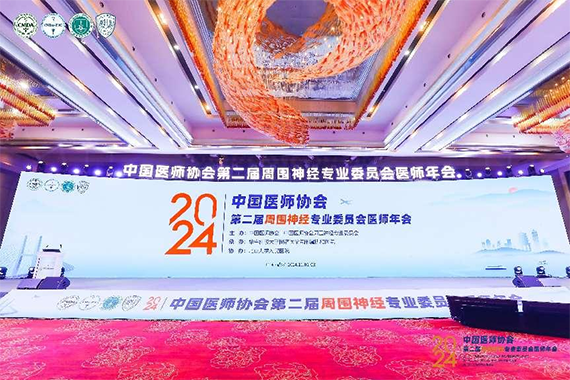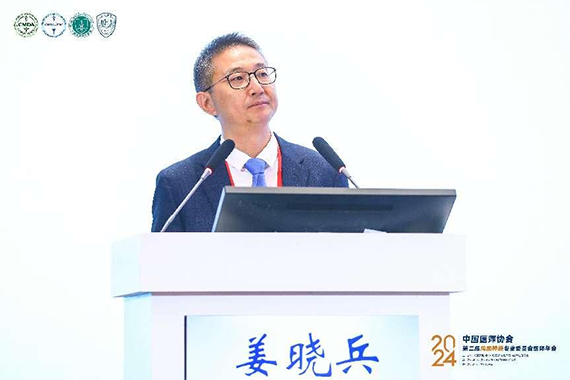
.png)
The 2nd Annual Conference of the Peripheral Nerve Specialty Committee of the Chinese Medical Doctor Association was successfully held at the Wuhan Eurasia Convention and Exhibition Center from November 1 to 3, 2024. The event was hosted by the Chinese Medical Doctor Association and its Peripheral Nerve Specialty Committee, organized by the Union Hospital Affiliated with Tongji Medical College of Huazhong University of Science and Technology, and co-organized by Peking University People's Hospital. Professor Liu Ru'en, Director of the Functional Neurosurgery Research Center at Peking University Health Science Center and Chairman of the Peripheral Nerve Specialty Committee of the Chinese Medical Doctor Association, served as the conference chairperson. Professor Jiang Xiaobing, Deputy Chairman of the Peripheral Nerve Specialty Committee and from the Union Hospital Affiliated with Tongji Medical College of Huazhong University of Science and Technology, served as the executive chairperson. The conference invited 4 academicians and over 1,100 scholars from across the country who specialize in the treatment and research of peripheral nerve diseases. The conference focused on the theme of "Innovation · Leadership" and featured discussions on a variety of hot topics, including cranial nerve diseases, peripheral nerve tumors, nerve injury and repair, autonomic nerve diseases, youth and interdisciplinary fields, peripheral nerve compression, neuromodulation, neurophysiology, and neurosurgical nursing. The conference included one main venue and 10 sub-venues.
Grand Opening Ceremony: Gathering Industry Elites, Discussing New Development Opportunities
The conference officially opened on the morning of November 2, 2024. The distinguished attendees included Vice Governor Wei Shengbing of the Hubei Provincial People's Government; Professor Zhou Liangfu, Director of the Neurosurgery Department at Shanghai Huashan Hospital, Honorary Chairman of the Peripheral Nerve Specialty Committee of the Chinese Medical Doctor Association, and Academician of the Chinese Academy of Engineering; Professor Wu Tangchun, Dean of Tongji Medical College at Huazhong University of Science and Technology and Academician of the Chinese Academy of Engineering; Shi Liying, Deputy Secretary-General of the Chinese Medical Doctor Association; Professor Ma Lianting of the Central Theater General Hospital; Chen Honghui, Director of the Hubei Provincial Health Commission; Professor Zhang Yonghui, Vice President of Huazhong University of Science and Technology; Professor Zhang Yu, Party Secretary of the Union Hospital Affiliated with Tongji Medical College of Huazhong University of Science and Technology; Professor Jia Wang, Deputy Party Secretary of Beijing Tiantan Hospital and President of the Neurosurgeon Branch of the Chinese Medical Doctor Association; Professor Wang Shuo, Chairman of the Neurosurgery Branch of the Chinese Medical Association; Professor Zhang Yazhuo, President of the World Chinese Neurosurgeon Association; Professor Liu Ru'en, Director of the Functional Neurosurgery Research Center at Peking University Health Science Center and Chairman of the Peripheral Nerve Specialty Committee of the Chinese Medical Doctor Association; All members of the Peripheral Nerve Specialty Committee of the Chinese Medical Doctor Association and professionals from across the country engaged in the diagnosis and treatment of peripheral nerve diseases. They all gathered at the Wuhan Eurasia Convention and Exhibition Center.

The opening ceremony was hosted by Professor Jiang Xiaobing, Director of the Neurosurgery Department at Union Hospital, affiliated with Tongji Medical College of Huazhong University of Science and Technology, and Executive Chairperson of the conference. Speeches were delivered by Party Secretary Zhang Yu, Professor Liu Ru'en, Professor Jia Wang, Academician Zhou Liangfu, Deputy Secretary-General Shi Liying, and Vice Governor Wei Shengbin.
In the welcome speech of Party Secretary Zhang Yu, he emphasized the significance of the "2nd Annual Conference of the Peripheral Nerve Specialty Committee of the Chinese Medical Doctor Association." He introduced the innovative developments at Union Hospital and highlighted the achievements of the neurosurgery department. He expressed hope that the conference would serve as a platform for participants to discuss cutting-edge technologies and contribute to advancing the neurological medical field, ultimately benefiting public health.
Professor Liu Ru'en, in his welcome address, expressed his excitement about the successful convening of the conference and thanked all the leaders and experts for their attendance. He reflected on Wuhan’s long history and its medical achievements, underscoring the importance of the Peripheral Nerve Specialty Committee in advancing neuroscience in China. He looked forward to the conference serving as a forum for participants to promote standardization and innovation in the field, thereby contributing to the goals of the Healthy China 2030 initiative.
Professor Jia Wang, President of the Neurosurgeon Branch of the Chinese Medical Doctor Association, extended warm congratulations on the successful organization of the conference. He was deeply impressed by the conference’s scale and the enthusiasm of the participants. He commended the work of the specialty committee under Chairman Liu Ru'en’s leadership and expressed confidence that the committee would continue to progress and achieve long-term development.
Academician Zhou Liangfu emphasized that the establishment of the Peripheral Nerve Specialty Committee was a landmark event in Chinese neurosurgery. He noted that the committee provides an important platform for the systematization and standardization of peripheral nerve disease treatment, marking a milestone in the history of these diseases’ treatment in China. He further highlighted that the committee’s efforts not only foster academic exchanges both domestically and internationally but also inject new vitality into medical research and clinical practice in China.
On behalf of the Chinese Medical Doctor Association, Deputy Secretary-General Shi Liying congratulated the conference organizers and extended a warm welcome to all the leaders, guests, and participants at the opening ceremony. She also paid tribute to the experts who have made outstanding contributions to peripheral neurosurgery. The Peripheral Neurosurgery Branch of the Chinese Medical Doctor Association, established in 2021, has achieved remarkable progress in just three years in areas such as discipline development, team building, talent cultivation, and grassroots physician training. Notable achievements include: Actively conducting research on the current state of peripheral neurosurgery to clarify the development direction of the association. Gradually improving the organizational framework, thereby facilitating the construction of the discipline. Actively organizing standardized training and developing operational guidelines and standards for related specialties. Professor Liu Ru'en led the compilation of the monograph Peripheral Neurosurgery, which systematically addresses the surgical diagnosis and treatment of peripheral nerve diseases. This monograph, published by the People's Medical Publishing House, was selected for the "14th Five-Year Plan" National Key Publication Project. Strengthening the construction of the peripheral neurosurgeon team and talent cultivation, with a focus on providing free clinic training for grassroots physicians. Actively promoting academic exchanges and establishing a high-level platform for collaboration among peripheral neurosurgeons.

Finally, Vice Governor Wei Shengbin of the Hubei Provincial People's Government delivered an important speech at the opening ceremony.
Academic Exchange: A Collision of Ideas and Inspiration for the Future
After the opening ceremony, the academic exchange sessions began in the main venue. The first session was the Academician Forum, chaired by Professors Wang Shuo and Ma Lianting. Two academicians presented their academic reports:
Academician Zhou Liangfu, in his speech titled "Clinical Medical Innovation and Others", reviewed the history of neurosurgery development in China. He emphasized that innovation is one of the key drivers for the future advancement of neurosurgery.
Academician Wu Tangchun, in his speech titled "Protecting Human Health and Sharing a Beautiful Life", systematically expounded on the current status of brain disease diagnosis and treatment. He discussed the results of multiple large-scale studies and promoted the development of patient-centered preventive medicine research.
High-level Keynote Speeches: Focusing on Cutting-edge Research
The second session, chaired by Professors Zhao Hongyang and Zhang Jianning, featured the following keynote speeches:
Professor Zhang Yazhuo presented on "Optic Nerve Protection and Functional Remodeling after Injury in Endoscopic Transnasal Sphenoid and Sellar Region Tumor Surgery". He provided a detailed explanation of how to effectively protect the optic nerve during the perioperative period of endoscopic surgery for sellar region tumors, highlighting the key points of intraoperative management and important precautions for postoperative care.
Professor Liu Ru'en, in his speech on "Standardized Treatment of Trigeminal Neuralgia", discussed the advantages and disadvantages of various treatment methods for trigeminal neuralgia. He proposed a standardized approach to diagnosis and treatment and provided practical suggestions for managing common complications, offering more treatment options for patients.
The third session, chaired by Professors Zhao Jiannong, Bao Shengde, and Shi Huaizhang, included the following presentations:
Professor Chen Guoqiang, in his talk titled "Analysis of the Causes and Hazards of Cotton Pad Granuloma Formation after 'MVD'", analyzed the risks associated with cotton pad granuloma using real case studies and proposed potential solutions.
Professor Li Shiting, in his speech on "Surgical Technique Innovation and Application of Cranial Nerve Syndrome", introduced innovative surgical techniques for treating cranial nerve syndrome, aiming to provide more effective treatment options for patients.
The fourth session, chaired by Professors Chen Jincao, Zhang Qiang, and Chen Qianxue, featured the following presentations:
Professor Jiang Xiaobing, in his talk on "Medical-Engineering Cross-Innovation Research on Intracranial Signal Monitoring", introduced his team's work on innovations in the integration of medical and engineering fields. They achieved significant breakthroughs in clinical non-invasive, real-time intracranial monitoring equipment.
Professor Niu Chaoshi, in his speech on "The Current Situation and future of neuroregulatory treatments for dystonia", introduced neuroregulatory treatments for dystonia, addressing the challenges faced by patients and offering a vision for future advancements in this field.
The team led by Professor Wu Anhua presented "Research Progress in Spinal Cord Injury Repair". They discussed the latest research developments in spinal cord injury repair, highlighting their clinical applications and the potential role of artificial intelligence in post-injury rehabilitation.
Multi-session Discussions: Interdisciplinary Collaboration Driving Diagnostic and Therapeutic Innovations
On the afternoon of November 2 and the morning of November 3, 10 sub-venues hosted simultaneous academic exchanges, showcasing the latest achievements and practices in various specialties, including neurosurgery, orthopedics, and hand surgery. Each sub-venue featured keynote speeches and discussions led by renowned experts, fostering a vibrant and dynamic academic atmosphere. Additionally, the conference included satellite and special topic meetings, focusing on specific subjects to encourage interdisciplinary exchange and integration of ideas.
Under the care and guidance of the Chinese Medical Doctor Association, the annual conference concluded successfully. This event provided a high-end platform for participants to share innovative achievements and engage in forward-looking discussions about the future of the field. Through the exchange of ideas and intellectual collaboration, the conference further advanced the development of peripheral neurosurgery.
During the conference, the Plenary Committee of the Peripheral Nerve Specialty Committee of the Chinese Medical Doctor Association convened. An election was held to determine the host unit for the next annual conference, with the Second Affiliated Hospital of Chongqing Medical University being selected. The hospital will host the 3rd Annual Conference of the Peripheral Nerve Specialty Committee of the Chinese Medical Doctor Association in Chongqing in 2025. We eagerly anticipate the 3rd Annual Conference in Chongqing, where we will continue to strengthen the peripheral neurosurgery field, contribute to its advancement, and further promote innovation and collaboration in this important medical specialty.